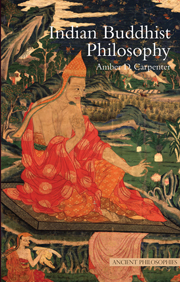Book contents
- Frontmatter
- Contents
- Preface
- Acknowledgements
- Abbreviations
- Chronology
- Development of Buddhist thought in India
- 1 The Buddha's suffering
- 2 Practice and theory of no-self
- 3 Kleśas and compassion
- 4 The second Buddha's greater vehicle
- 5 Karmic questions
- 6 Irresponsible selves, responsible non-selves
- 7 The third turning: Yogācāra
- 8 The long sixth to seventh century: epistemology as ethics
- Epilogue
- Background information
- Notes
- Bibliography
- Index
1 - The Buddha's suffering
- Frontmatter
- Contents
- Preface
- Acknowledgements
- Abbreviations
- Chronology
- Development of Buddhist thought in India
- 1 The Buddha's suffering
- 2 Practice and theory of no-self
- 3 Kleśas and compassion
- 4 The second Buddha's greater vehicle
- 5 Karmic questions
- 6 Irresponsible selves, responsible non-selves
- 7 The third turning: Yogācāra
- 8 The long sixth to seventh century: epistemology as ethics
- Epilogue
- Background information
- Notes
- Bibliography
- Index
Summary
The legend is familiar, and simply told. At the birth of the only heir to the family fortune, wise men confer and determine that the child will either be a great ascetic or else a great ruler. Greatly preferring the latter outcome for his son, the father does his best to bring up the boy in luxury, in a comfort designed to offer no occasion for untoward thoughts of renunciation or joining up with the wandering ascetics, society's dropouts, known even in far-off Greece for their naked insight.
Suddhodana, even in the fifth century BCE, would not have been the first father whose careful, well-meaning plans were thwarted by a headstrong son. For adolescent Siddhartha Gautama, the heir apparent, takes to stealing away from the comforts of home, riding about town to discover what his father has been keeping from him. What he discovers, to his shock and dismay, is sickness: disease, aged decrepitude and death – all the ugly, mundane miseries that befall a person. Just as Suddhodana thinks he has his son safely married off, Siddhartha determines to leave it all behind and go out in search of some answers. Shortly after the birth of his own son, and in spite of all temptations to enjoy the goods that wealth, family and status can confer, Siddhartha slips away.
- Type
- Chapter
- Information
- Indian Buddhist Philosophy , pp. 1 - 19Publisher: Acumen PublishingPrint publication year: 2013

